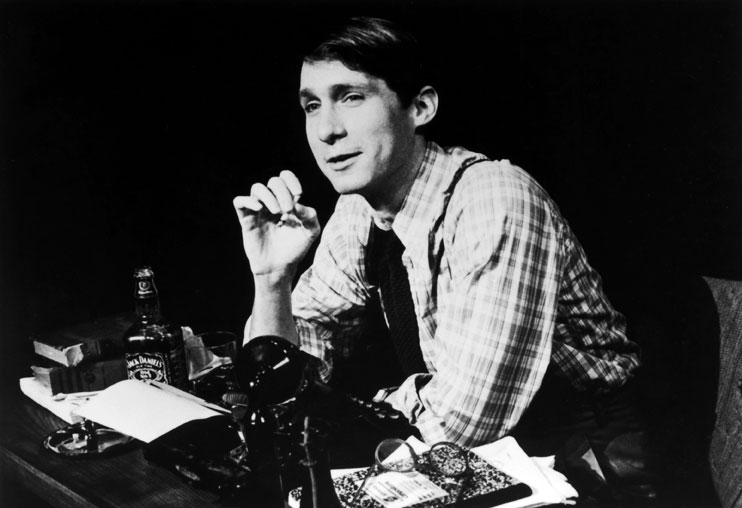Broadway Musical Time Machine: Looking Back at City of Angels
Musical theatre styles derive from many genres, including operetta, folk, and jazz. Remarkably, there are very few musicals that embrace the jazz and blues styles as the basis for their scores. Then came City of Angels, the jazziest, swingingest, bluesiest musical to ever hit Broadway, while also being an accurate pastiche of the Film Noir. City of Angels was assembled by some of Broadway's most unique talents. Music was composed by Cy Coleman who was well-known for scores such as Little Me, Sweet Charity, On the Twentieth Century, and Barnum. Coleman was one of the most eclectic of all composers, capable of writing in almost any musical style you could imagine. The book was by Larry Gelbart who, with Burt Shevlove, wrote the raucous libretto for the farcical musical A Funny Thing Happened on the Way to the Forum. Gelbart also served as a writer and producer for the prolific television comedy M*A*S*H. For lyrics, City of Angels would introduce audiences to the wit and wordplay of David Zippel who would go on to write the lyrics for the Disney film Hercules (with composer Alan Menken) and for the Broadway musical The Goodbye Girl (with composer Marvin Hamlisch).
James Naughton, Kay McClelland and Gregg Edelman with cast in a scene from the Broadway musical "City of Angels"
Cy Coleman was always a bit of a stylistic whore where his compositions were concerned, expertly transitioning from musical comedy to operetta to country to whatever genre best suited the piece he was writing for. City of Angels demonstrated, once again, how eclectic a composer he was Coleman created some terrific and distinct melodies for the score of City of Angels, tunes that evoke the Film Noir oeuvre and that are painted with an Old Hollywood splendor. This is Tinsel Town at it’s grittiest and its grandest. The smoky “With Every Breath I Take” conjures pictures of dive nightclubs, cheap whiskey and rainy nights lit by neon. “Alaura’s Theme”, slow and distant at first, builds into an explosion of Silver Screen pastiche, overflowing with grandeur and elegance while being simultaneously melodramatic and cliché. City of Angels is arguably Coleman’s best score: textured, layered, and melodically pleasing.
Randy Graff in City of Angels.
As his collaborator, Coleman worked with the relative newbie (at the time), lyricist David Zippel. Zippel was the perfect wordsmith to set the tone for City of Angels. His lyrics for songs such as “What You Don’t Know About Women”, “Funny”, “You’re Nothing Without Me” and “You Can Always Count on Me” smack with a wit, sarcasm and intelligence that not only shape and evolve the edgy characters, but speak from the cerebral concept of duality that is the central conceit of City of Angels. It’s essentially two stories happening at the same time, one based in reality where an author is adapting one of his books for the screen, the other the actual movie he is writing). Zippel had to find two voices for these distinct stories that occasionally bleed into one another. There is nothing saccharine about these people, but there IS something old Hollywood about them, and Zippel captures them with an acerbic and biting poetry.
Of course what makes City of Angels such a unique musical is its two-story format, each commenting on one another. Two musicals for the price of one, playing out, often simultaneously and congruently. One wishes that Larry Gelbart had written more books for musicals than he did. He has an expert grasp of pacing, a dry wit that also embraces both sarcasm and pun, and a feel for the required tone of each character. For City of Angels, he demonstrated a knack for recreating the dialogue that made Film Noir a distinct genre. Gelbart created a writer named Stine, an author of crime novels who is hired to adapt one of his books, featuring his popular character the gumshoe Stone, for the big screen. As Stine tackles the ins-and-outs of Hollywood and marriage, his story, predicaments and characters are paralleled in the film. The performers in City of Angels move back and forth between both stories, playing their character in Stine’s world and their alter ego I the movie. It’s all very clever and what makes City of Angels a musical like none other.
Gregg Edelman, Dee Hoty and James Naughton
Some interesting facts about City of Angels:
- City of Angels opened at Broadway’s Virginia Theatre (now named The August Wilson) on December 11, 1989 and ran for 879 performances.
- The original Broadway production won a handful of Tony Awards including Best Musical, Best Actor: James Naughton, Best Featured Actress: Randy Graff, Best Score, Best Book, and Best Scenic Design: -Robin Wagner.
- In 2011 The Goodspeed Opera House produced an expert revival of City of Angels that was directed by Darko Tresnjak and that found a way to handle the show’s myriad scenic challenges in an effective way that employed a tiered set, venetian blinds and projections. The production featured Burke Moses, D.B. Bonds, Nancy Anderson and Liz Pearce.














